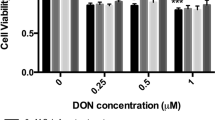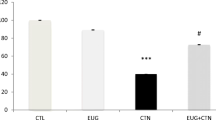Abstract
The bile salt, deoxycholate (DOC), can harm cells and cause disease. Hence, there is interest in identifying compounds capable of protecting cells against DOC. In HCT-116 colon epithelial cells, DOC increased generation of reactive oxygen species and caused DNA damage and apoptosis. These effects of DOC were inhibited by rottlerin, which is a phenolic compound of plant origin. In elucidating its mechansim, rottlerin prevented the release of cytochrome c from mitochondria into cytosol, and also prevented the cleavage of caspase-3. Yet, rottlerin by itself markedly decreased mitochondrial membrane potential and increased mitochondrial superoxide production, but this did not result in cytochrome c release or in caspase-3 cleavage. At a higher test concentration, two other phenolic phytochemicals, namely, quercetin and resveratrol, were each able to largely prevent the occurrence of apoptosis in cells exposed to DOC. In contrast, epigallocatechin gallate, curcumin, and genistein were ineffective.








Similar content being viewed by others
References
Paumgartner G (2006) Medical treatment of cholestatic liver diseases: from pathobiology to pharmacological targets. World J Gastroenterol 12:4445–4451
Stadler J, Stern HS, Sing-Yeung KA, McGuire V, Furrer R, Marcon N et al (1988) Effect of high fat consumption on cell proliferation activity of colorectal mucosa and on soluble faecal bile acids. Gut 29:1326–1331. doi:10.1136/gut.29.10.1326
Bernstein H, Holubec H, Bernstein C, Ignatenko NA, Gerner E, Dvorak K et al (2007) Deoxycholate-induced colitis is markedly attenuated in Nos2 knockout mice in association with modulation of gene expression profiles. Dig Dis Sci 52:628–642. doi:10.1007/s10620-006-9608-0
Bernstein H, Bernstein C, Payne CM, Dvorakova K, Garewal H (2005) Bile acids as carcinogens in human gastrointestinal cancers. Mutat Res 589:47–65. doi:10.1016/j.mrrev.2004.08.001
Sokol RJ, Winklhofer-Roob BM, Devereaux MW, McKim JM Jr (1995) Generation of hydroperoxides in isolated rat hepatocytes and hepatic mitochondria exposed to hydrophobic bile acids. Gastroenterol 109:1249–1256. doi:10.1016/0016-5085(95)90585-5
Powolny A, Xu J, Loo G (2001) Deoxycholate induces DNA damage and apoptosis in human colon epithelial cells expressing either mutant or wild-type p53. Int J Biochem Cell Biol 33:193–203. doi:10.1016/S1357-2725(00)00080-7
Scott DW, Mutamba S, Hopkins RG, Loo G (2005) Increased GADD gene expression in human colon epithelial cells exposed to deoxycholate. J Cell Physiol 202:295–303. doi:10.1002/jcp.20135
Gschwendt M, Muller HJ, Kielbassa K, Zang R, Kittstein W, Rincke G et al (1994) Rottlerin, a novel protein kinase inhibitor. Biochem Biophys Res Commun 199:93–98. doi:10.1006/bbrc.1994.1199
Bossy-Wetzel E, Green DR (2000) Assays for cytochrome c release from mitochondria during apoptosis. Methods Enzymol 322:235–242. doi:10.1016/S0076-6879(00)22024-7
Blois MS (1958) Antioxidant determinations by the use of a stable free radical. Nature 181:1199–1200. doi:10.1038/1811199a0
Marchetti MC, Migliorati G, Moraca R, Riccardi C, Nicoletti I, Fabiani R et al (1997a) Possible mechanisms involved in apoptosis of colon tumor cell lines induced by deoxycholic acid, short-chain fatty acids, and their mixtures. Nutr Cancer 28:74–80
Marchetti C, Migliorati G, Moraca R, Riccardi C, Nicoletti I, Fabiani R et al (1997b) Deoxycholic acid and SCFA-induced apoptosis in the human tumor cell-line HT-29 and possible mechanisms. Cancer Lett 114:97–99. doi:10.1016/S0304-3835(97)04634-X
van Gurp M, Festjens N, van Loo G, Saelens X, Vandenabeele P (2003) Mitochondrial intermembrane proteins in cell death. Biochem Biophys Res Commun 304:487–497. doi:10.1016/S0006-291X(03)00621-1
Yui S, Kanamoto R, Saeki T (2008) Deoxycholic acid can induce apoptosis in the human colon cancer cell line HCT116 in the absence of Bax. Nutr Cancer 60:91–96
Tillman DM, Izeradjene K, Szucs KS, Douglas L, Houghton JA (2003) Rottlerin sensitizes colon carcinoma cells to tumor necrosis factor-related apoptosis-inducing ligand-induced apoptosis via uncoupling of the mitochondria independent of protein kinase C. Cancer Res 63:5118–5125
Liao YF, Hung YC, Chang WH, Tsay GJ, Hour TC, Hung HC et al (2005) The PKC delta inhibitor, rottlerin, induces apoptosis of haematopoietic cell lines through mitochondrial membrane depolarization and caspases’ cascade. Life Sci 77:707–719. doi:10.1016/j.lfs.2005.01.010
Ringshausen I, Oelsner M, Weick K, Bogner C, Peschel C, Decker T (2006) Mechanisms of apoptosis-induction by rottlerin: therapeutic implications for B-CLL. Leukemia 20:514–520. doi:10.1038/sj.leu.2404113
Basu A, Adkins B, Basu C (2008) Down-regulation of caspase-2 by rottlerin via protein kinase C-delta-independent pathway. Cancer Res 68:2795–2802. doi:10.1158/0008-5472.CAN-07-6244
Song KS, Kim JS, Yun EJ, Kim YR, Seo KS, Park JH et al (2008) Rottlerin induces autophagy and apoptotic cell death through a PKC-delta-independent pathway in HT1080 human fibrosarcoma cells: the protective role of autophagy in apoptosis. Autophagy 4:650–658
Shah SA, Mahmud N, Mftah M, Roche HM, Kelleher D (2006) Chronic but not acute conjugated linoleic acid treatment inhibits deoxycholic acid-induced protein kinase C and nuclear factor-kappaB activation in human colorectal cancer cells. Eur J Cancer Prev 15:125–133. doi:10.1097/01.cej.0000195708.72072.42
Redlak MJ, Power JJ, Miller TA (2006) Protein kinase C involvement in deoxycholate-induced apoptosis in human gastric cells. Dig Dis Sci 51:834–843. doi:10.1007/s10620-006-9346-3
Shah SA, Looby E, Volkov Y, Long A, Kelleher D (2005) Ursodeoxycholic acid inhibits translocation of protein kinase C in human colonic cancer cell lines. Eur J Cancer 41:2160–2169. doi:10.1016/j.ejca.2005.06.015
Brodie C, Blumberg PM (2003) Regulation of cell apoptosis by protein kinase c delta. Apoptosis 8:19–27. doi:10.1023/A:1021640817208
Blass M, Kronfeld I, Kazimirsky G, Blumberg PM, Brodie C (2002) Tyrosine phosphorylation of protein kinase C delta is essential for its apoptotic effect in response to etoposide. Mol Cell Biol 22:182–195. doi:10.1128/MCB.22.1.182-195.2002
Davies SP, Reddy H, Caivano M, Cohen P (2000) Specificity and mechanism of action of some commonly used protein kinase inhibitors. Biochem J 351:95–105. doi:10.1042/0264-6021:3510095
Soltoff SP (2001) Rottlerin is a mitochondrial uncoupler that decreases cellular ATP levels and indirectly blocks protein kinase Cdelta tyrosine phosphorylation. J Biol Chem 276:37986–37992
Soltoff SP (2007) Rottlerin: an inappropriate and ineffective inhibitor of PKCdelta. Trends Pharmacol Sci 28:453–458. doi:10.1016/j.tips.2007.07.003
Dall’Agnol M, Bernstein C, Bernstein H, Garewal H, Payne CM (2006) Identification of S-nitrosylated proteins after chronic exposure of colon epithelial cells to deoxycholate. Proteomics 6:1654–1662. doi:10.1002/pmic.200500240
Jenkins GJ, D’Souza FR, Suzen SH, Eltahir ZS, James SA, Parry JM et al (2007) Deoxycholic acid at neutral and acid pH, is genotoxic to oesophageal cells through the induction of ROS: the potential role of anti-oxidants in Barrett’s oesophagus. Carcinogenesis 28:136–142. doi:10.1093/carcin/bgl147
Yerushalmi B, Dahl R, Devereaux MW, Gumpricht E, Sokol RJ (2001) Bile acid-induced rat hepatocyte apoptosis is inhibited by antioxidants and blockers of the mitochondrial permeability transition. Hepatology 33:616–626. doi:10.1053/jhep.2001.22702
Gumpricht E, Dahl R, Devereaux MW, Sokol RJ (2004) Beta-carotene prevents bile acid-induced cytotoxicity in the rat hepatocyte: Evidence for an antioxidant and anti-apoptotic role of beta-carotene in vitro. Pediatr Res 55:814–821. doi:10.1203/01.PDR.0000117845.23762.6B
Long LH, Clement MV, Halliwell B (2000) Artifacts in cell culture: rapid generation of hydrogen peroxide on addition of (-)-epigallocatechin, (-)-epigallocatechin gallate, (+)-catechin, and quercetin to commonly used cell culture media. Biochem Biophys Res Commun 273:50–53. doi:10.1006/bbrc.2000.2895
Johnson MK, Loo G (2000) Effects of epigallocatechin gallate and quercetin on oxidative damage to cellular DNA. Mutat Res 459:211–218
Acknowledgements
This study was supported by the National Research Initiative of the USDA Cooperative State Research, Education and Extension Service (grant number 2006-35200-16578), and also by the North Carolina Agricultural Research Service (NC06659).
Author information
Authors and Affiliations
Corresponding author
Rights and permissions
About this article
Cite this article
Longpre, J.M., Loo, G. Protection of human colon epithelial cells against deoxycholate by rottlerin. Apoptosis 13, 1162–1171 (2008). https://doi.org/10.1007/s10495-008-0244-3
Published:
Issue Date:
DOI: https://doi.org/10.1007/s10495-008-0244-3




